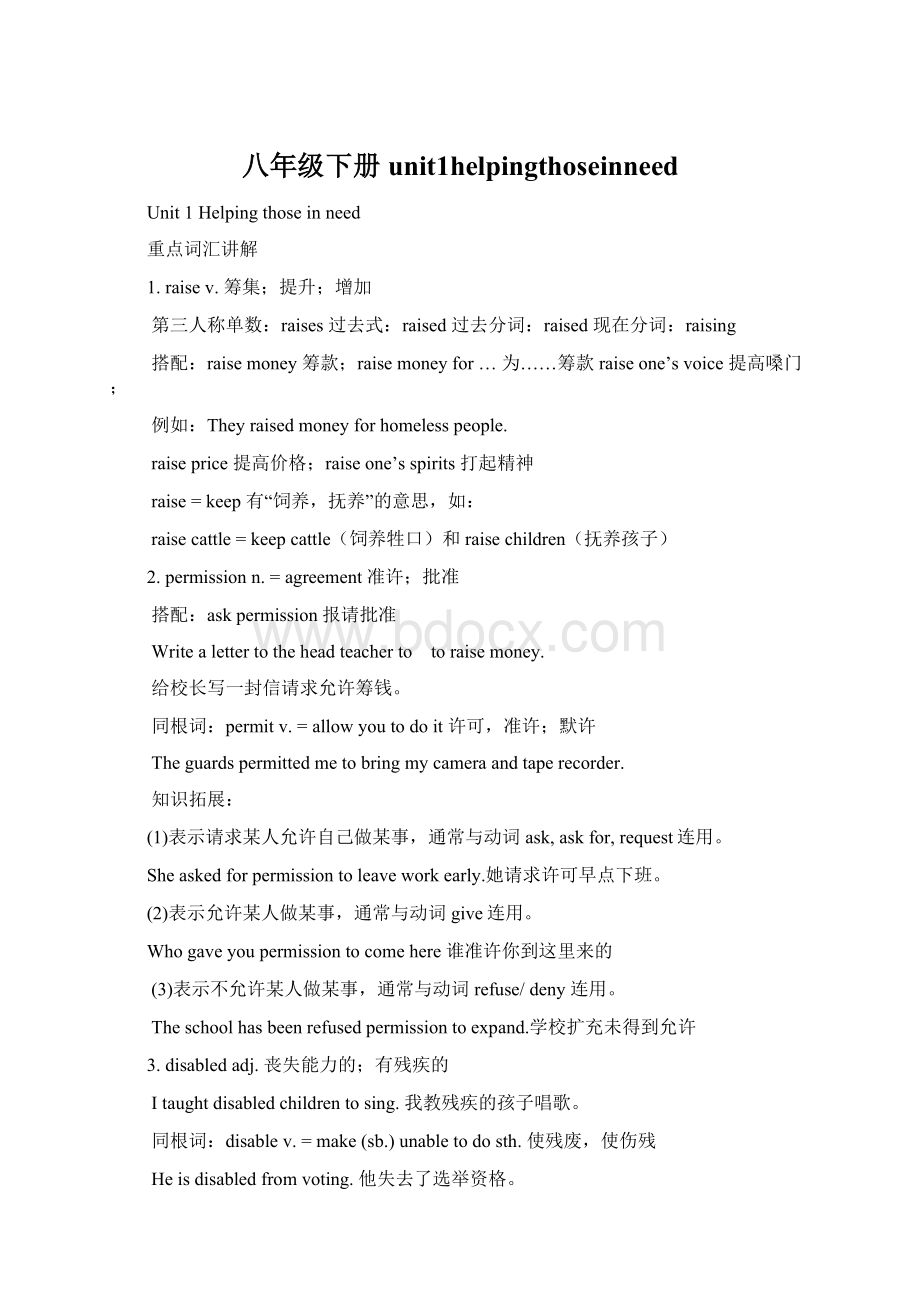八年级下册unit1helpingthoseinneed.docx
《八年级下册unit1helpingthoseinneed.docx》由会员分享,可在线阅读,更多相关《八年级下册unit1helpingthoseinneed.docx(20页珍藏版)》请在冰豆网上搜索。

八年级下册unit1helpingthoseinneed
Unit1Helpingthoseinneed
重点词汇讲解
1.raisev.筹集;提升;增加
第三人称单数:
raises过去式:
raised过去分词:
raised现在分词:
raising
搭配:
raisemoney筹款;raisemoneyfor…为……筹款raiseone’svoice提高嗓门;
例如:
Theyraisedmoneyforhomelesspeople.
raiseprice提高价格;raiseone’sspirits打起精神
raise=keep有“饲养,抚养”的意思,如:
raisecattle=keepcattle(饲养牲口)和raisechildren(抚养孩子)
2.permissionn.=agreement准许;批准
搭配:
askpermission报请批准
Writealettertotheheadteachertotoraisemoney.
给校长写一封信请求允许筹钱。
同根词:
permitv.=allowyoutodoit许可,准许;默许
Theguardspermittedmetobringmycameraandtaperecorder.
知识拓展:
(1)表示请求某人允许自己做某事,通常与动词ask,askfor,request连用。
Sheaskedforpermissiontoleaveworkearly.她请求许可早点下班。
(2)表示允许某人做某事,通常与动词give连用。
Whogaveyoupermissiontocomehere谁准许你到这里来的
(3)表示不允许某人做某事,通常与动词refuse/deny连用。
Theschoolhasbeenrefusedpermissiontoexpand.学校扩充未得到允许
3.disabledadj.丧失能力的;有残疾的
Itaughtdisabledchildrentosing.我教残疾的孩子唱歌。
同根词:
disablev.=make(sb.)unabletodosth.使残废,使伤残
Heisdisabledfromvoting.他失去了选举资格。
enablev.?
[?
n'e?
b(?
)l]?
=make(sb.)abletodosth.使(某人)能够做某事
Thenewtestshouldenabledoctorstodetectthediseaseearly.
新的检测手段应该能够使医生们尽早查出这种疾病。
搭配:
mentallydisabled有智力缺陷learningdisabilities学习障碍
4.offerv.=bewillingtodosomething主动提出
搭配:
offertodosth.主动提出去做某事,愿意做某事
Peterofferedtoteachthemwater-skiing.彼得主动提出教他们滑水。
搭配:
offerone’shand伸出友好的手offersb.sth.为某人提供某物
Theyhaveofferedmealargesumofmoneytogoaway.他们曾为我提供一大笔搬迁费
例如:
offersb.主动提出帮助某人;offersb.agoodsalary给某人一个好工资。
Somehowshemanagedtoprovideherchildrenwithfoodandclothing.
她总算设法使她的孩子有饭吃,有衣穿。
Heofferedmeaglassofwine.=Heofferedaglassofwinetome.他端给我一杯酒。
5.illnessn.(某种)病
Thechildrenthereallsufferfromseriousillness.那里的孩子都遭受疾病的折磨。
同根词:
illadj.有病的(比较级:
worse,最高级:
worst)
6.organizev.组织
Intheend,wealldecidedtoorganizeaconcertforEaster.最终,我们一致决定组织一场复活节音乐会。
同根词:
organizationn.组织;机构organizern.组织者organizedadj.有组织的
Whatdoyouknowaboutourorganization关于我们的组织你知道些什么
Studentsneedorganizedactivities.学生们需要有组织的活动。
Whoistheorganizeroftheexhibition谁是这次展览会的组织者
7.expressv.表达;表露
Thishelpsthemexpresstheirfeelings.这有助于他们表达他们的情感。
同根词:
expressionn.表现,表示,表达;表情
Shegaveexpressiontohersadness.她流露出了悲伤之情。
8.lonelyadj.孤独的;寂寞的;荒凉的(比较级:
lonelier最高级:
loneliest)
Itfeltliketheloneliestplaceintheworld.感觉这就像是天底下最荒凉的地方。
辨析:
lonely,alone的区别:
alone为形容词,意为“单独的”,只作表语,不能作定语。
侧重说明独自一人,没有助手或同伴,没有感情色彩的只表示客观的状态。
lonely意为“孤独的”,表示主观上感到孤独、寂寞,有较浓的感情色彩,指因缺少朋友、同情、友谊等产生的一种悲伤和忧郁的感情。
它为形容词,在句中作表语或定语。
作定语时,意为“荒凉;偏僻”,多修饰表示地点的名词。
alone还可以作副词。
aloneadv.单独;独自
Shewenthomealone.=Shewenthomebyherself.她独自回家去了。
Ididn’tfeellonelythoughIwasalone.我虽孤身一人,但并不感到寂寞。
9.friendshipn.友情;友谊
同根词:
friendn.朋友复数:
friends.
Truefriendshipisworthmorethanmoney.真正的友谊比金钱更有价值。
friendlyadj.友好的
Roberthasafriendlyrelationshipwithhiscustomers.罗伯特和他的客户之间关系处得很好。
10.difficultyn.=benotabletodosomethingeasily困难;费劲
Thecountryisfacinggreateconomicdifficulties.该国正面临巨大的经济困难。
同根词:
difficultadj.=hardtodo困难的
Thechildisgoingthroughadifficultphase.那孩子正经历困难的阶段。
It’sdifficultforme.对我来说这很难。
搭配:
havedifficulty(in)doingsomething做……有困难
Ihadnodifficulty(in)makingmyselfunderstood.我毫不费力地表达了自己的意思。
indifficulty/difficulties处境困难
Thebankisindifficulty/difficulties.这家银行处境困难。
11.joyn.=afeelingofgreathappiness愉快;喜悦
Itaughtthemtosingbecausemusiccanbringthemjoyandpeace.
我教他们唱歌,因为音乐能带给他们喜悦与宁静。
同根词:
joyfuln.快乐的,高兴的;令人开心的,使人喜悦的
Hewasexcitedandjoyfulatthesuccess.他因成功而激动欣喜。
搭配:
toone’sjoy令人高兴的是,使某人高兴的是
Toherjoyhersonwaspermittedtoakeyuniversity.
12.peacen.平静;宁静
theNobelPeacePrize诺贝尔和平奖
OnemorequestionandI’llleaveyouinpeace.再问一个问题,我就不打扰你了。
同根词:
peacefuladj.和平的;爱好和平的;安静的;平静的
Eveninginthecountryisaverypeacefultime.乡村里的今晚是平静安谧的时刻。
13.hurtv.=injure使疼痛;受伤
Timhurthislegsinanaccident,buthehaslotsofcourage.
提姆在一次事故中伤了腿,但他很勇敢。
同根词:
hurtadj.受伤的;痛苦的;(受)损坏的
Theydidnotseemtobebadlyhurt.他们看起来没有受重伤。
搭配:
hurtoneself自己受伤
Haveyouhurtyourself你伤着自己了吗
注意:
身体伤害重用badly修饰。
精神、感情受到创伤用verymuch/rather/deeply修饰
Thedriverhurthimselfbadlyintheaccident.那位司机在事故中伤得很重。
Yourwordsdeeplyhurther.你的话深深地伤害了她。
14.couragen.勇气;勇敢
同根词:
encouragev.鼓励,鼓舞;支持;促进;鼓动
MyEnglishteacheroftenencouragesustoreadEnglishaloud.
我的英语老师常常鼓励我们大声读英语。
gathercourage鼓足勇气losecourage失去勇气
Failureisthemotherofsuccess.Keepupyourcourage.失败是成功之母。
鼓起你的勇气来。
15.spiritsn.情绪,心境
Hefeltinexcellentspiritswhenhearrivedhome.他回到家里是情绪非常好。
spiritn.精神,勇气,意志。
Eventhoughheisnolongerliving,hisspiritlivesontoday.尽管他已经不再人世,但他的精神却至今还在。
固定搭配:
inspirit在心里,在精神上
16.payv.付款;偿还
Wepaid35poundsforeachticket.我们每张票付了35英镑。
同根词:
payn.工资;薪水;报答
Theycomplainedabouttheirpayandconditions.他们抱怨他们的薪水和工作条件。
搭配:
payoff偿清(债务);支付(债务)的全部数额
payattentionto注意payavisitto去参观,拜访payfor为……付款
辨析:
take,spend,cost和pay的用法区别:
总结:
take一般用it作主语,例如:
ittakessb.sometimetodosth.
spend一般是人作主语,例如:
Ispendanhourfinishingmyhomework.
cost表示某物值什么的(价值或钱),例如:
Thebookcost200yuan.
pay一般是人作主语,例如:
Ipaylotsofmoneyforbooks.
spend的主语必须是人,常用于以下结构:
(1)spendtime/moneyonsth.在……上花费时间(金钱)。
例如:
Ispenttwohoursonthismathproblem.这道数学题花了我两个小时。
(2)spendtime/money(in)doingsth.花费时间(金钱)做某事。
例如:
Theyspenttwoyears(in)buildingthisbridge.造这座桥花了他们两年时间。
(3)spendmoneyforsth.花钱买……例如:
Hismoneywasspentforbooks.他的钱用来买书了。
cost的主语是物或某种活动,还可以表示“值”,常见用法如下:
(1)sth.costs(sb.)+金钱,某物花了(某人)多少钱。
例如:
Anewcomputercostsalotofmoney.
(2)(doing)sth.costs(sb.)+时间,某物(做某事)花了(某人)多少时间。
例如:
Rememberingthesenewwordscosthimalotoftime.他花了大量时间才记住了这些单词。
注意:
cost的过去式及过去分词都是cost,并且不能用于被动句。
take后面常跟双宾语,常见用法有以下几种:
(1)Ittakessb.+时间+todosth.做某事花了某人多少时间。
例如:
Ittookthemthreeyearstobuildthisroad.他们用三年时间修完了这条路。
(2)doingsth.takessb.+时间,做某事花了某人多少时间。
例如:
Repairingthiscartookhimthewholeafternoon.他花了一下午修车。
pay的基本用法是:
(1)pay(sb.)moneyforsth.付钱(给某人)买……例如:
Ihavetopaythem20poundsforthisroomeachmonth.我每个月要付20英镑的房租。
(2)payforsth.付……的钱例如:
Ihavetopayforthebooklost.我不得不赔丢失的书款。
(3)payforsb.替某人付钱例如:
Don’tworry!
I’llpayforyou.别担心,我会给你付钱的。
(4)paysb.付钱给某人例如:
Theypayuseverymonth.他们每月给我们报酬。
(5)paymoneyback还钱例如:
MayIborrow12yuanfromyouI’llpayitbacknextweek.
(6)payoffone’smoney还清钱。
17.voluntaryadj.自愿的;志愿的
Hemadeavoluntarystatementtothepolice.他自愿为警方作供。
18.beusedfordoing被用来做(某事)
beusedtodo被用来去做``````
beusedas把······用作,被用来当作······
beusedby(某物)被某人使用,by后接动词的执行者
beusedto(doing)sth.习惯于(做某事)
usedtodosth.过去常常做某事
Thismedicineisusedforcuringcancer.这种药物是用于治疗癌症的。
Clothesareusedtokeepwarm.衣服是用来保暖的。
Theboxisusedasatable.这个箱子被当作桌子用。
ThiscarisusedbyMr.Li.这是李先生的专用轿车。
Myfatherisusedtogettingupearly.我爸爸习惯于早起。
Iusedtodanceafterschool.我过去常常放学后跳舞。
Inthepast,peopleusedtousehorsesastheirtransport.
19.sincethen自从那时起
sinceIwasborn自从我出生时
since+时间点(用于完成时)
自从5点开始他就在等了。
Hehaswaitedsince5o’clock.
陈先生自从2岁起就住在这儿。
Mr.Chenhaslivedheresince2yearsold.
我们自从七年前开始就学习英语了。
WehavelearnedEnglishsince7yearsago.
重点短语
1.inneed需要帮助的
2.voluntarywork义务性工作
3.askpermission报请批准
4.sufferfrom…因......受苦;受折磨
5.raiseone’sspirits使鼓起勇气;使振奋
6.raisemoney…筹募钱
7.teachsbtodo…教某人去做……
8.needtodo…需要做……
9.lookafter…照顾……
10.inone’sfreetime在某人空闲时间
11.helpsbdo…帮助某人做……
12.continuetodo…继续做……
13.inthefuture将来
14.workas...从事……工作
15.attendschool上学
16.writetosb给某人写信
17.givesbpermissiontodo批准某人做……
18.becauseof...因为……
19.beunabletodo...不能做……
20.stayathome呆在家
21.takepartin参加
22.thinkabout考虑
23.inorderto目的在于;为了
ForReading
I.根据句意及图片提示写单词,补全句子。
1.Wearetryingto_____moneytohelpkidswithoutparents.
2.Ithinkeveryoneshouldtryto
understandandhelp____people.
3.A______issomeonewhoisbetween
thirteenandnineteenyearsold.
4.This______isholdingalegalknowledgecontest(法律知识竞赛).
5.Unluckily,Jim_____hishandwhenhewantedtopeel(削)anapple
forhisgrandma.
II.根据要求写出相应的单词。
6.offer(第三人称单数形式)
__________________
7.organize(一般过去时)
__________________
8.spirit(复数)
__________________
9.express(过去分词)
__________________
10.difficult(名词)
__________________
III.根据句意及首字母提示写单词,完成句子。
11.WhenIsawthelookofj_____onthesickboy'sface,Ifelthappy.
12.Thedoctoristhinkingofawaytomakethesickboygetlessp_____.
13.Tooursurprise,thecaraccidentwasn'tsos______aswecouldimagine.
14.Theoldwomanlivesinthecountrysidealone,soshefeelsveryl______.
15.Whenweface(面对)ourownproblems,weneedalotofc______.
IV.用括号里词的适当形式填空,完成句子。
16.You'llhavetoask______(permit)ifyouwanttogointotheoffice.
17.Ifyouareinhigh______(spirit),youhaveagoodfeeling.
18.Lastweek,MrGreenhelpedus_______(organize)asingingcompetition.
19.Everyday,Igotoachildren'shospitaltoseeasickboy_______(call)Eric.
20.Thesedayspeoplemaygetallkindsofstrange______(ill)becauseofpollution.
21.Ineed________(study)hardandmakeprogresseveryday.
22.Iused______(go)toworkbytaxi,butnowIridemybikeforwork.
语法运用
动词不定式由“to+动词原形”构成,有时可以不带to。
它没有人称和数的变化,其否定式是在to前加上not。
它在句中可作宾语、宾语补足语和状语等。
具体用法见下表:
用法
例句
作宾语
在offer,plan,hope,choose,refuse,decide,learn,wish等动词之后作宾语:
Finallyheofferedto